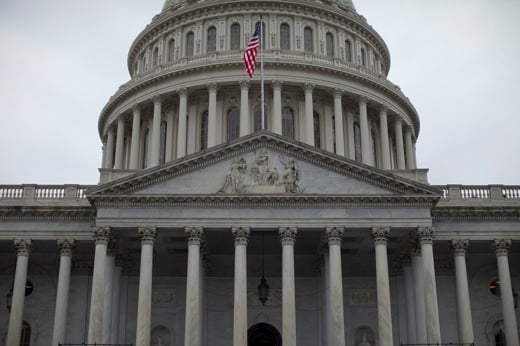Senate Democratic leaders proposed imposing a surtax on people earning at least $1 million a year to pay for President Barack Obama's jobs plan, an idea immediately rejected by Republicans as lawmakers head for a showdown over how to boost the economy.
Majority Leader Harry Reid, a Nevada Democrat, said yesterday the 5 percent tax would generate $450 billion, enough to cover the cost of the administration's proposal. Democrats dared Republicans, who oppose tax increases, to block the plan.
“The addition of this proposal makes it very tough for Republicans to oppose the president's jobs package,” said Senator Charles Schumer of New York, the chamber's third-ranking Democrat. “Republicans will be hard-pressed to explain why they'd allow teachers and firefighters to be laid off rather than have millionaires and billionaires pay their fair share.”
Democrats said they want to take up the measure next week after completing work on a measure targeting China's currency policies. Democrats, who control the chamber with 53 of 100 votes, will need the support of at least seven Republicans to bring the matter before the chamber.
Senate Minority Leader Mitch McConnell, a Kentucky Republican, said Democrats were rewriting the bill “not to make it more effective at growing jobs, not to grow bipartisan support.” Rather, he said, “They want to overhaul the bill to sharpen its political edge.”
A spokesman for House Speaker John Boehner, an Ohio Republican, rejected the surtax idea.
‘Common Ground'
“Republicans have identified areas of common ground where we can work with the president,” said spokesman Michael Steel. “That should be the focus, not desperate tax-hike gimmicks floated to cover up divisions within the Democratic caucus.”
Asked why Democrats chose to finance what they call must- pass legislation with a tax increase similar to those previously opposed by Republican lawmakers, Reid pointed to polls he said show Republican voters back higher taxes on the wealthy.
“They're going to have to listen to their constituents,” Reid told reporters.
Obama announced his $447 billion jobs plan Sept. 8 in an address to a joint meeting of Congress. It would extend and expand a payroll tax cut that expires at the end of this year, increase infrastructure spending, offer more aid to cash- strapped state governments and extend jobless benefits.
Since then, Obama has gone on the road, urging and sometimes mocking Republican leaders for not taking up the measure. “What's the problem?” Obama said two days ago at a community college in the Dallas suburb of Mesquite. “Do they not have the time? They just had a week off. Is it inconvenient?”
China Currency
Senate Democrats also haven't been in a hurry to bring the plan before the chamber. They opted to first take up the China currency measure as they worked to resolve differences over the jobs plan within their own caucus.
Democrats such as Ben Nelson of Nebraska and Joe Manchin of West Virginia, who face tough re-election fights next year, have expressed reservations about Obama's plan. Reid said he would allow colleagues unhappy with the proposal to offer floor amendments.
Among the most divisive issues is how to pay for the measure, which Obama has said shouldn't add to the deficit. The proposed millionaires' tax would replace the administration's plan to limit tax deductions for those earning at least $250,000, cut tax breaks for the oil and gas industry, and raise taxes on corporate jets.
RELATED STORY States with the highest taxes
The Senate Democrats' surcharge would apply to all income over $1 million regardless of whether it came from capital gains or from salaries. The top marginal tax rate is currently 35 percent while capital gains are subject to a 15 percent levy.
‘The Right Line'
“We believe the million dollars is the right line,” Schumer said, because there are people who make $250,000 or $300,000 “in many of our states who are not rich.” He said setting the threshold at $1 million would also avoid imposing a tax increase on many small businesses.
Schumer last year unsuccessfully pushed for an amendment that would have allowed tax cuts enacted in 2001 and 2003 to expire for millionaires.
“We have spent the last several weeks planning how it can win the most votes on the Senate floor,” and “we believe we have found the best answer available,” said Schumer. “The president from the beginning said he welcomes alternative ways of paying for it -- we think we have found the best way.”
--Bloomberg News--







